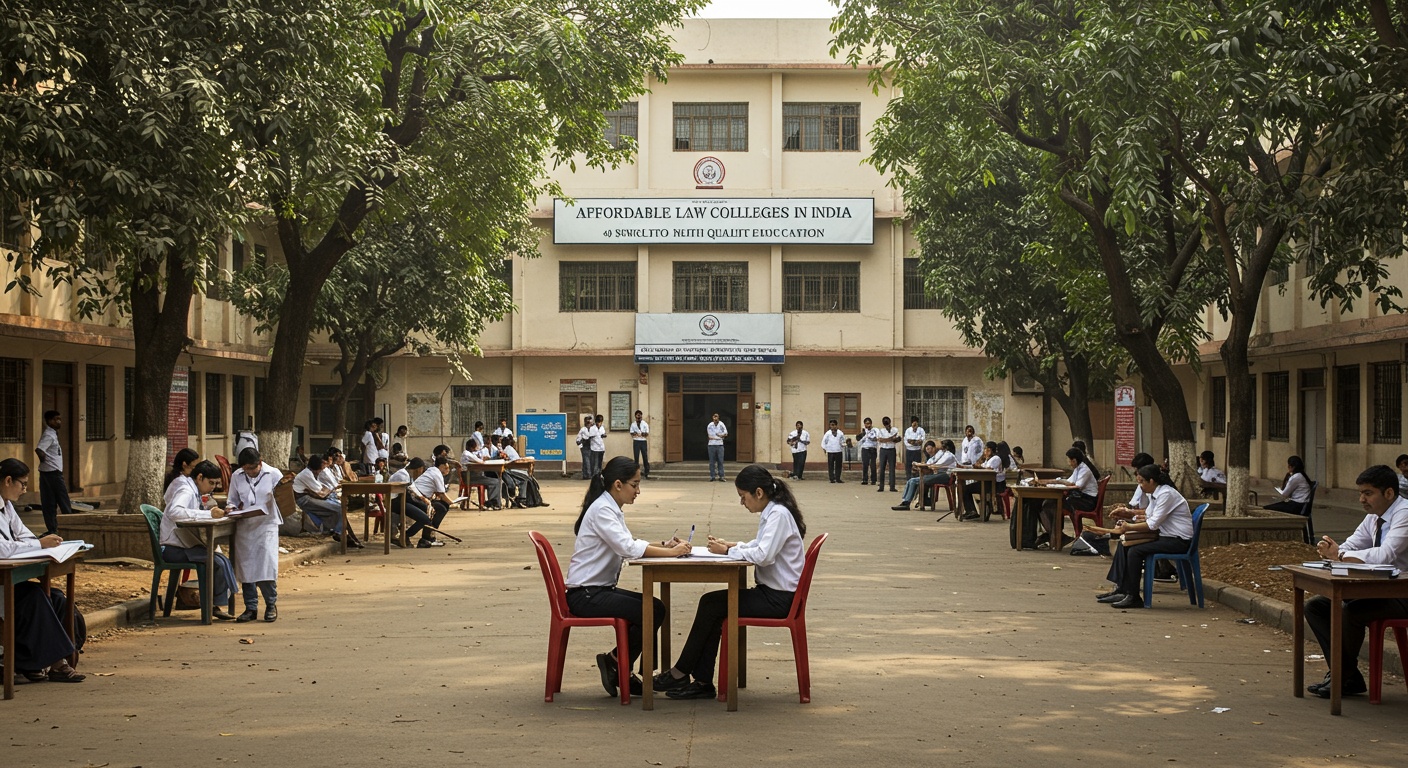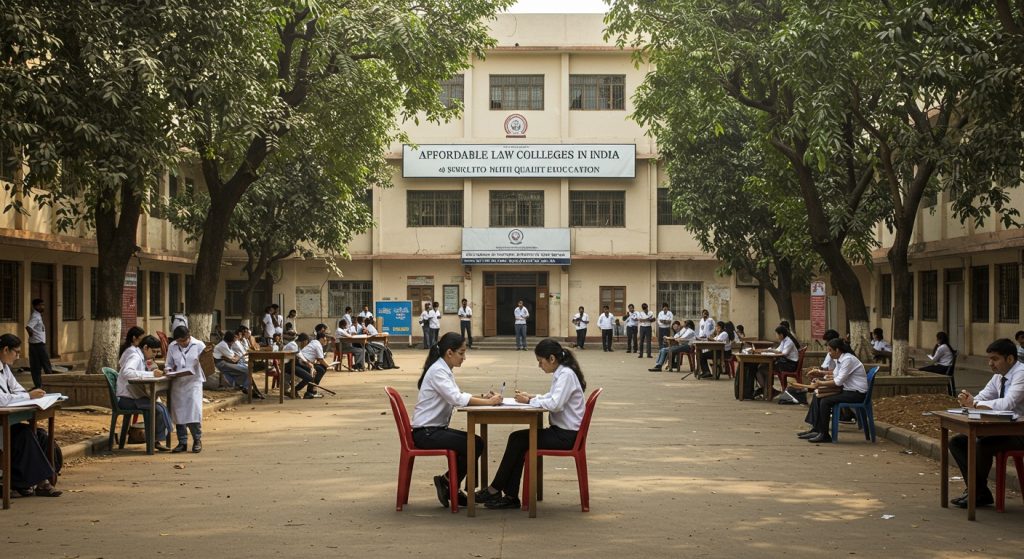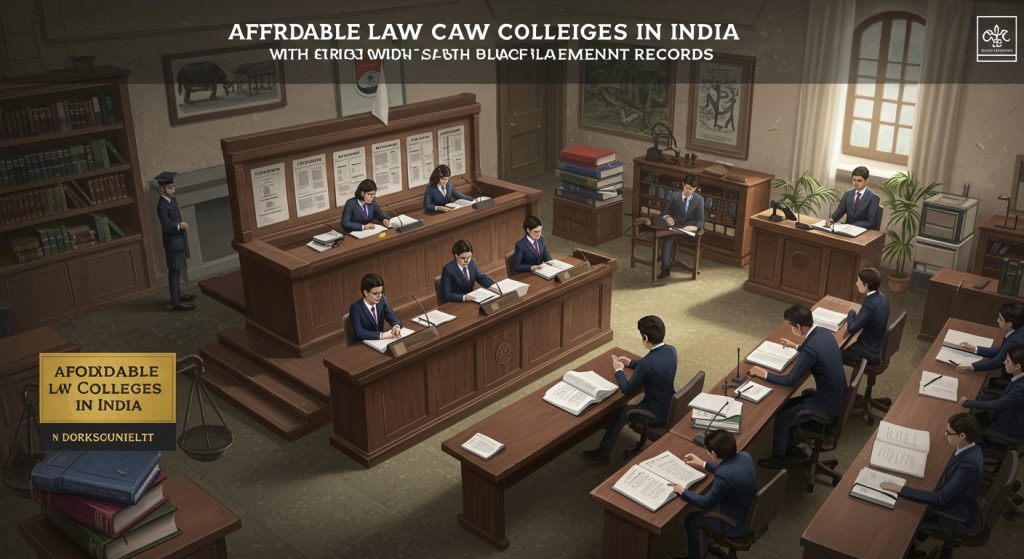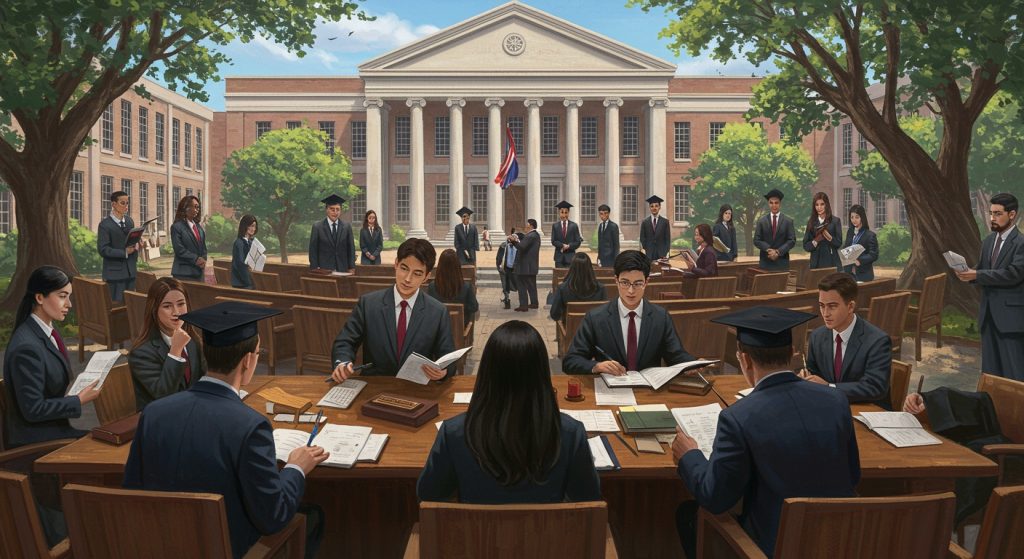Dreaming of donning the black robes and arguing landmark cases. Worried about the hefty price tag of legal education? You’re not alone. The Indian legal landscape is evolving rapidly, demanding skilled professionals, yet access to quality law education often feels financially restrictive. But, affordable pathways exist. Several institutions across India are committed to providing exceptional legal training without breaking the bank. We’ll explore these colleges, focusing on criteria like faculty expertise, Bar Council recognition, infrastructure, placement records. Unique specializations such as cyber law or environmental law, enabling you to make an informed decision and embark on your legal journey with confidence and fiscal prudence.

Understanding the Landscape of Legal Education in India
Legal education in India is governed by the Bar Council of India (BCI), which sets the standards for legal education and recognizes Law colleges. The BCI’s role is crucial in ensuring that institutions provide quality education and prepare students for a successful career in the legal profession. The legal field offers diverse career paths, including litigation, corporate Law, legal advising, judicial services. Academia.
Affordable Law colleges are those institutions that offer Law programs at a relatively lower cost compared to private institutions and national Law universities (NLUs). While NLUs are prestigious, their fees can be prohibitive for many students. Affordable Law colleges often include government-funded institutions, state universities. Private colleges with scholarship programs or lower tuition fees.
Key Factors to Consider When Choosing a Law College
Selecting the right Law college is a critical decision. Here are some essential factors to evaluate:
- Accreditation and Recognition: Ensure the college is recognized by the Bar Council of India (BCI). Accreditation guarantees that the college meets the required standards for legal education.
- Faculty Quality: Look for experienced faculty members with strong academic backgrounds and practical legal experience. A good faculty can significantly enhance the learning experience.
- Infrastructure and Resources: Check for adequate facilities such as a well-stocked library, moot court halls, computer labs. Online resources. A conducive learning environment is essential for effective education.
- Course Curriculum: Evaluate the relevance and comprehensiveness of the curriculum. A well-structured curriculum should cover core legal subjects and offer opportunities for specialization.
- Placement Opportunities: Research the college’s placement record and connections with Law firms, corporate organizations. Government agencies. Good placement opportunities increase the chances of securing a job after graduation.
- Location and Accessibility: Consider the college’s location and accessibility. Proximity to courts, Law firms. Other legal institutions can provide valuable internship and networking opportunities.
- Cost and Financial Aid: Assess the total cost of tuition, accommodation. Other expenses. Explore available scholarships, grants. Financial aid options to make education more affordable.
Top Affordable Law Colleges in India
While the definition of “affordable” can vary, here are some Law colleges that generally offer quality education at a reasonable cost. Note that fees and rankings can change, so it’s essential to verify the latest data.
- Government Law College, Mumbai: One of the oldest Law colleges in Asia, GLC Mumbai offers a 3-year LL. B. Program and a 5-year integrated LL. B. Program. It’s known for its strong faculty and alumni network.
- ILS Law College, Pune: Another prestigious institution, ILS Pune, offers various Law programs and is recognized for its academic rigor and research activities.
- Faculty of Law, Banaras Hindu University (BHU), Varanasi: BHU’s Faculty of Law provides a comprehensive legal education with a focus on social justice and constitutional values. The fees are relatively low due to it being a central university.
- Faculty of Law, Aligarh Muslim University (AMU), Aligarh: AMU’s Faculty of Law is known for its emphasis on legal research and advocacy. It offers various Law programs at an affordable cost.
- Department of Law, University of Calcutta, Kolkata: This department offers a range of Law courses and is known for its strong academic focus and experienced faculty.
- Jindal Global Law School (JGLS), Sonipat (merit-based scholarships): While JGLS is a private university, it offers merit-based scholarships that can significantly reduce the financial burden for deserving students.
- Symbiosis Law School (SLS) (merit-based scholarships): Similar to JGLS, SLS offers scholarships based on academic performance, making it more accessible for talented students.
- NALSAR University of Law, Hyderabad (scholarships and fee waivers): Although considered a top NLU, NALSAR provides scholarships and fee waivers to students from economically weaker sections, making it relatively affordable for some.
Comparing Affordable Law Colleges: A Detailed Look
To help you make a more informed decision, here’s a comparison of some affordable Law colleges based on key factors:
| College Name | Location | Course Offered | Approximate Fees (per year) | Key Strengths | Potential Weaknesses |
|---|---|---|---|---|---|
| Government Law College, Mumbai | Mumbai, Maharashtra | 3-year LL. B. , 5-year Integrated LL. B. | ₹7,000 – ₹10,000 | Strong Alumni Network, Experienced Faculty | Limited Infrastructure, High Competition |
| ILS Law College, Pune | Pune, Maharashtra | 3-year LL. B. , 5-year Integrated LL. B. | ₹30,000 – ₹40,000 | Academic Rigor, Research Focus | Relatively Higher Fees Compared to GLC Mumbai |
| Faculty of Law, BHU | Varanasi, Uttar Pradesh | 3-year LL. B. , 5-year Integrated LL. B. | ₹5,000 – ₹8,000 | Affordable, Focus on Social Justice | Infrastructure May Be Limited |
| Faculty of Law, AMU | Aligarh, Uttar Pradesh | 3-year LL. B. , 5-year Integrated LL. B. | ₹10,000 – ₹15,000 | Emphasis on Legal Research, Affordable | Location May Not Be Ideal for All |
| Department of Law, University of Calcutta | Kolkata, West Bengal | 3-year LL. B. , LL. M. | ₹8,000 – ₹12,000 | Strong Academic Focus, Experienced Faculty | Infrastructure May Be Limited |
Financial Aid and Scholarship Opportunities
Many affordable Law colleges offer various financial aid and scholarship programs to assist students with their education expenses. These scholarships can be based on merit, financial need, or specific categories (e. G. , students from backward classes, women, or students with disabilities). Some common scholarship schemes include:
- Central Sector Scheme of Scholarship for College and University Students: Offered by the Ministry of Human Resource Development (MHRD), this scholarship provides financial assistance to meritorious students from economically weaker sections.
- State Government Scholarships: Many state governments offer scholarships to students domiciled in their respective states. These scholarships vary in terms of eligibility criteria and the amount of financial assistance provided.
- Private Scholarships: Numerous private organizations, trusts. Foundations offer scholarships to Law students. These scholarships often have specific eligibility requirements and application procedures.
- College-Specific Scholarships: Many Law colleges offer their own scholarship programs based on merit, financial need, or other criteria. Check the college’s website or contact the admissions office for more insights.
- Merit-Based Scholarships: These scholarships are awarded to students who have demonstrated exceptional academic performance in their previous examinations.
- Need-Based Scholarships: These scholarships are awarded to students who come from economically weaker sections and are unable to afford the cost of legal education.
Real-World Applications and Use Cases
Graduates from affordable Law colleges have successfully pursued diverse careers in the legal field. Here are some real-world applications and use cases:
- Litigation: Many graduates become practicing advocates in various courts, representing clients in civil and criminal cases. Affordable Law colleges often provide practical training through moot courts and internships to prepare students for litigation.
- Corporate Law: Some graduates join corporate Law firms or become legal advisors for companies, handling contracts, intellectual property. Regulatory compliance.
- Judicial Services: Graduates can prepare for judicial service examinations to become judges in various courts. Affordable Law colleges often offer coaching and guidance for these examinations.
- Legal Research: Some graduates pursue careers in legal research, working for think tanks, research institutions, or academic organizations.
- Government Service: Graduates can join government service as legal officers, public prosecutors, or legal advisors to government departments.
- Academia: Some graduates pursue higher education (LL. M. , Ph. D.) and become Law professors or lecturers in universities and colleges.
Case Study: Consider the example of a graduate from Government Law College, Mumbai, who started his career as a junior advocate in a small Law firm. Through hard work and dedication, he gradually built his practice and eventually became a successful senior advocate, arguing cases in the High Court and Supreme Court. His affordable legal education provided him with a strong foundation and enabled him to achieve his career goals.
The Role of Internships and Practical Training
Internships and practical training are crucial components of legal education. They provide students with hands-on experience and exposure to the real-world legal environment. Affordable Law colleges often have tie-ups with Law firms, corporate organizations. Government agencies to provide internship opportunities to their students.
During internships, students can:
- Observe court proceedings and learn about courtroom etiquette.
- Assist lawyers with legal research and drafting of legal documents.
- Attend client meetings and learn about client management.
- Participate in moot court competitions and develop their advocacy skills.
- Network with legal professionals and build valuable connections.
Practical training can also include:
- Moot court sessions that simulate court proceedings.
- Legal aid clinics that provide free legal services to the poor and needy.
- Visits to courts, tribunals. Other legal institutions.
- Workshops and seminars on various legal topics.
Conclusion
The journey to becoming a legal professional doesn’t always require breaking the bank. We’ve explored avenues for accessing quality legal education in India without incurring crippling debt. Remember, a law degree is an investment. The ROI depends not only on the institution’s reputation but also on your dedication and networking. Don’t shy away from exploring scholarships, government aid. Even negotiating fee structures. The legal landscape is evolving rapidly with the rise of technology and globalization. Therefore, seek out institutions that emphasize practical skills, critical thinking. Exposure to emerging legal fields. My personal tip? Attend open houses and talk to current students – their experiences are invaluable. Choose a college that aligns with your career aspirations and learning style. The path to a fulfilling legal career is within reach; believe in yourself, stay persistent. Make informed decisions. Your legal future awaits!
More Articles
Top Law Schools Offering International Law Degrees
Affordable Engineering Colleges In India With High ROI
Affordable Architecture Programs In Southeast Asia
Best Colleges For Computer Science with Industry Placements
FAQs
So, what’s the deal? Can you actually find affordable and good law colleges in India?
Absolutely! It’s a common misconception that affordability means sacrificing quality. While some super-expensive private colleges exist, there are plenty of government-funded and private institutions offering excellent legal education at a reasonable cost. The key is knowing where to look and what to prioritize.
Okay. What exactly makes a law college ‘affordable’ anyway? What kind of fees are we talking about?
Good question! ‘Affordable’ is relative. Generally, we’re talking about colleges where the annual tuition fees are significantly lower than the top-tier private institutions. This could range from ₹20,000 to ₹80,000 per year, sometimes even less for government colleges. Keep in mind that living expenses are a separate factor!
Which are some of these ‘affordable’ law colleges that people rave about?
Well, a few names often pop up. Some Government Law Colleges (GLCs) in different states like Mumbai, Chennai. Kolkata are known for their low fees and decent faculty. Some National Law Universities (NLUs) also offer scholarships and fee waivers to make education accessible. Plus, numerous private colleges affiliated with state universities can offer a great bang for your buck.
What should I be looking for besides low fees to make sure I’m getting a quality legal education?
Definitely! Focus on faculty expertise, the college’s reputation, the quality of their library and online resources, moot court opportunities. Internship programs. A strong alumni network can also be a huge plus for career prospects.
Are these ‘affordable’ colleges super competitive to get into? Like, do I need to be a genius?
They can be competitive, especially the well-regarded government colleges and NLUs. But don’t get discouraged! A good CLAT score (for NLUs) or state-level law entrance exam score is crucial. Preparation is key. You don’t need to be Einstein. Diligence and a genuine interest in law go a long way.
What’s the catch? Are there any downsides to choosing an affordable law college?
Honestly, it depends on the college. Some might have older infrastructure or fewer extracurricular activities compared to pricier options. Networking opportunities might also be slightly different. But, these are often minor trade-offs compared to the significant financial burden you avoid. Focus on maximizing the resources that are available to you!
Any final tips for finding these hidden gems of affordable legal education?
Do your research! Explore college websites thoroughly, connect with current students or alumni on LinkedIn. Read reviews online. Don’t be afraid to visit campuses if possible. Also, look into state government scholarships and financial aid programs – they can make a huge difference!



